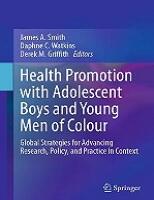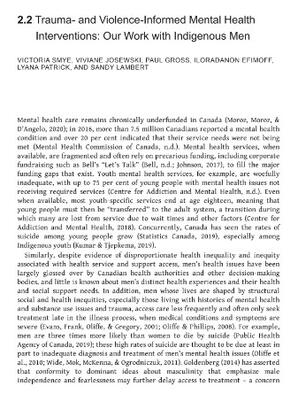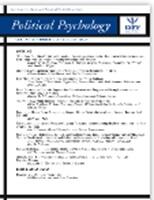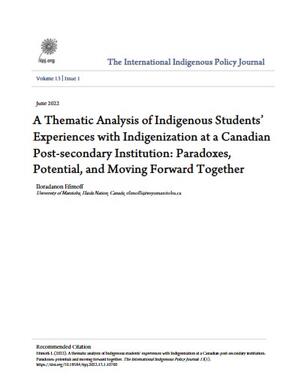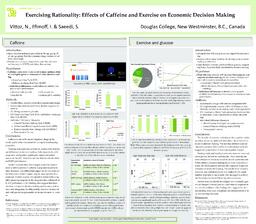Efimoff, Iloradanon
Person Preferred Name
Iloradanon Efimoff
Related Works
Content type
Digital Document
Abstract
Iloradanon Efimoff (Douglas College Student Alumni) contributed the chapter "Where are our men? How the DUDES Club has supported Indigenous men in British Columbia, Canada to seek a path of healing and wellness." (2023).
Origin Information
Content type
Digital Document
Abstract
Iloradanon Efimoff (Douglas College Student Alumni) contributed the chapter "Trauma - and violence - informed mental health interventions: Our work with Indigenous men." (2023).
Origin Information
Content type
Digital Document
Abstract
Published work by a Douglas College Student Alumni. The pursuit of intergroup reconciliation often includes efforts to educate with the goal of fostering empathy. Yet little empirical evidence demonstrates whether and why greater knowledge might increase empathy. In this research, we investigated whether more critical historical knowledge about a harmed outgroup increases empathy for them, and we explored whether perceptions of privity, the extent to which a past harm continues to cause suffering today, account for this relationship. We tested these hypotheses in the context of non-Indigenous Canadians' knowledge of Indian Residential Schools and attitudes about Indigenous Peoples across eight laboratory studies with 1242 non-Indigenous undergraduate students at two Canadian universities. In two studies, participants completed a multiple-choice measure of knowledge. In the remaining studies, we experimentally varied knowledge through brief educational interventions. All studies included measures of empathy, and five studies included measures of privity. Internal meta-analyses indicated that participants with higher levels of critical historical knowledge felt more empathy for the outgroup because they could better see how past intergroup harms continue to cause suffering today. We discuss implications for social and political psychological theory and designing education for reconciliation interventions in Canada and elsewhere.
Origin Information
Content type
Digital Document
Abstract
Published work by a Douglas College Student Alumni. Indigenization is a relatively new phenomenon in Canada. It is a broad concept that includes everything from changing physical spaces to challenging Western epistemologies and the status quo. In this study, I describe nine Indigenous students’ experiences with Indigenization at the University of Saskatchewan. Students were impacted both positively and negatively by their engagement: They described both opportunities borne of engagement with Indigenization and detriments such as exhaustion and lack of basic needs. In terms of methods to Indigenize, the participants described the importance of representation, centring Indigenous values and knowledges, and creating communities that can Indigenize. I end the paper with four policy recommendations for post-secondary institutions interested in Indigenization.
Origin Information
Content type
Digital Document
Abstract
Published work by a Douglas College Student Alumni. Anti-Indigenous racism is a pressing issue in Canada. Education on historical and contemporary Indigenous topics is a common strategy to challenge such racism. Despite the existence of education-based programmes intended to address anti-Indigenous racism, there is limited evidence that they are effective. To this end, we report the results of two longitudinal experiments (N1 = 639, N2 = 1099) assessing the effect of education on anti-Indigenous racism. In both studies, we assessed the impact of five conditions on Indigenous-related outcomes in samples of non-Indigenous students. All experimental conditions included information on historical and current injustices toward Indigenous people. In some conditions, we added content on individual racism, systemic racism, or both individual and systemic racism. Results indicated that the experimental conditions improved Indigenous-related thoughts, feelings, knowledge and behaviours. Further, the conditions containing systemic racism content outperformed the other conditions. These studies showcase the potential of education to reduce anti-Indigenous prejudice.
Origin Information
Content type
Digital Document
Abstract
Poster presented at the Society for Judgement and Decision Making (2015, 36th annual conference), Chicago, IL, USA.
Origin Information
Content type
Digital Document
Abstract
Caffeine is one of the most ubiquitous drugs in the world, and is often consumed for its cognitive enhancing properties. The current research investigated the influence of caffeine on two commonly used measures of risky decision making (the Iowa Gambling Task and the Balloon Analogue Risk Task). Findings indicated that caffeine improved performance on the IGT but not on the BART. However, inclusion of individual differences on decision making style and impulsivity generated regression models that explained a significant proportion of variance in performance on the IGT and BART. Multiple significant correlations existed among a variety of individual difference trait measures of decision-making style, impulsive tendencies and risk-taking behaviour. Results and implications are discussed in terms of two prominent decision-making theories as well as prior research, and further research directions are suggested that may help elucidate the apparently contradictory effects of caffeine on two distinct measures of risky decision making.
Author keywords:
Origin Information

